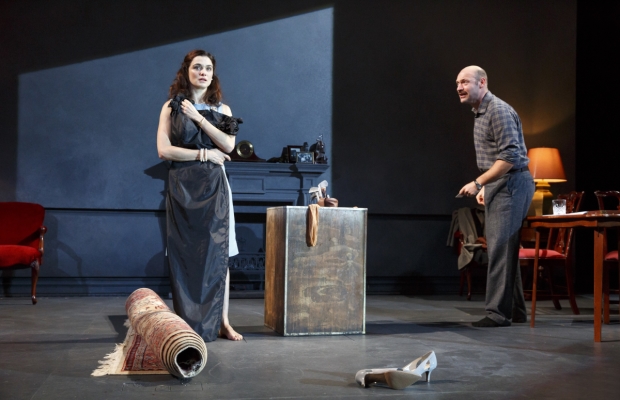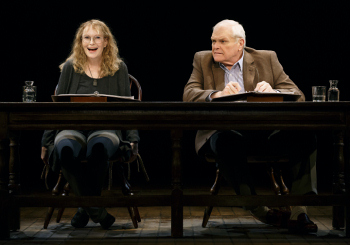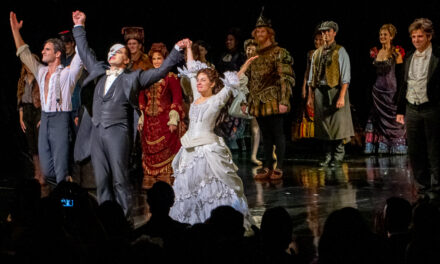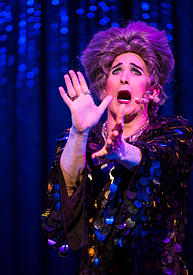by Carol Rocamora
Every so often a play comes along that defines an era. Such is the case with Plenty, David Hare’s landmark 1978 drama about post World War II England, now being given a clear-eyed revival at the Public that is both moving and haunting in its retrospective insights.
In a series of non-linear scenes (some are flashbacks), Plenty follows the fate of Susan Traherne, Hare’s young protagonist, over several decades – from her short time as a British courier working with the French resistance to the post war years in London and her descent into disillusionment. In Nazi-occupied France, Susan (an educated, middle-class young woman) had a thrilling purpose. But now, back in England. she’s restless, rudderless. “I want to move, I want to change!” she explains to her bohemian friend Alice, referring both to herself and to England.
But Susan doesn’t know how to affect the change she so desperately craves. So she drifts from job to job, and from man to man. A femme fatale of sorts, Susan (as played by the radiant Rachel Weisz) attracts a naive young diplomat named Brock (Corey Stoll) with a savior complex. Brock takes Susan on as a project and marries her even though she mistreats him. As a result, she becomes more reckless, impulsive, and irresponsible. She acts out, suffers a breakdown, and ultimately costs Brock his job.
“A new Europe, a massive reconstruction – jobs, ideals, a marvelous time to be alive!” exclaims Darwin, a top level British diplomat, at the top of the play. “I think everyone’s going to be rich very soon,” Brock predicts. This was the post-war vision of hope, “peace and plenty”, as Hare puts it. But Cassandra-like, Susan sees the truth – namely, the imperviousness of the British class structure and the rigid, ossified political system that will not bring prosperity and change to all. Her self-destruction (which is, ultimately, her only accomplishment) becomes a metaphor for the decline of the British ruling class, whose insular attitudes bring the country down with it and deprive it of hope.
Under David Leveaux’s economic, restrained direction, the uniformly excellent cast shines. Rachel Weisz gives a deeply affecting performance in a role that matches Ibsen’s Hedda Gabler in its complexity. Like Hedda, Susan is an anti-heroine, railing against a social system she cannot alter. Susan doesn’t ask for pity, only for life and change – and that makes her descent (and Weisz’s fine performance) all the more poignant. As Brock, her martyred husband, Corey Stoll is the essence of kindness – a trait which Susan despises and rejects along with the culture it represents. As Darwin, the stuffy senior diplomat, Bryon Jennings surprises us by standing up to the British government during the Suez Crisis (1956) – a stand which Rachel applauds but can’t do any more than Darwin can in changing the ultimate humiliating outcome for Britain. “The flag still flies over a quarter of the human race,” says Darwin at the top of the play. With Suez, Hare is showing us the beginning of the empire’s decline.
“There will be days and days and days like this,” exclaims Susan ecstatically, in the last ironic moments of the play, as it flashes back to the story’s beginning. We see young Susan again, at the war’s end, standing on a hilltop over looking the beautiful French countryside. There’s a clear sky above (on Mike Britton’s beautiful, spare set), with a horizon as open as the hopeful future of a reconstituted Europe ahead. “A mackerel sky,” Susan keeps calling it – bright blue with only a few cumulus clouds to mar its brilliance. But the rest, as we know, is history.
Plenty, by David Hare, directed by David Leveaux, at the Public Theatre, now through December 1























